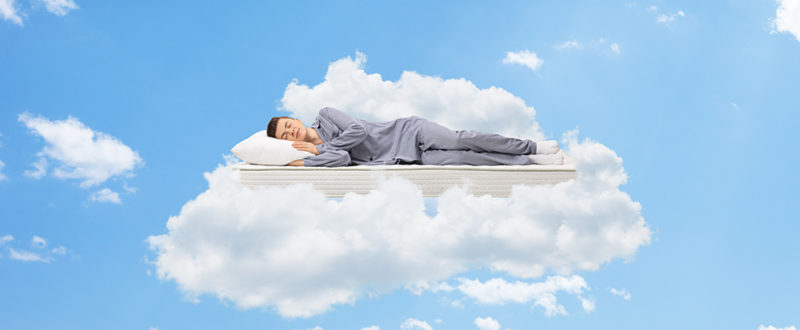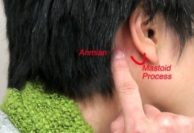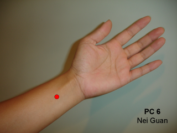
“To sleep, perchance to dream…”
Sleep is a period of reduced activity where we leave waking consciousness to drift into a land of dreams and deep rest. It is a restorative process that lets us to recover from the wear and tear of daily life, allowing our body’s cellular activity, heart rate and breathing to slow in order to conserve energy.
Why we need to sleep
While medical science still hasn’t been able to pinpoint why animals need to sleep at night, everyone agrees that a healthy adult requires on average between 7 to 9 hours of sleep per night to function at their best. Many believe that sleep is a time when the mind and body shut down. In fact, while the average 154-pound adult burns approximately 70 calories per hour relaxing and sitting on the couch, during sleep we still may burn as many as 63 calories per hour. This is because sleep is an active process where important processing, restoration and strengthening occurs.[i] Sleep is a time when we consolidate our memories, giving credence to the oft-given advice given when we feel frustrated and unable to solve a problem, to simply “sleep on it.”
A recent large-scale study found that getting less than seven hours of sleep each night resulted in an increased risk of heart disease. There is an increased risk of dementia and Alzheimer’s associated by too little sleep of 5 hours or less per night as well as too much, more than nine or ten hours a day.[ii]
Sleep plays a role in maintaining a healthy immune system. Ever wonder why when you are sick with the flu or a cold, you feel tired and need to sleep more? During sleep, the production of cytokines is increased, which helps the immune system fight off infections.
Sleep and our hormones
Additionally, adequate sleep is instrumental in replenishing and regulating our hormones. Hormones serve a chemical-messengers that prepare a cell, organ or surrounding tissues to adjust to outer stimuli such as adrenaline for the “fight or flight” response. Hormones also control digestion, growth, development and reproduction.
The ancient Chinese recognized the importance of hormonal health in maintaining healthy functioning of all the vital processes of the body and for longevity. This role was broadly classified under the rubric of “Kidney Qi.” The energy of the kidneys includes the hormonal regulating function of the adrenals which are divided into medullary hormones referred to as “Kidney Yang,” which govern the sympathetic hormones, and “Kidney Yin” which regulates the self-nurturing hormones of the parasympathetic nervous system.
We need a balance of both Kidney Yin and Yang to maintain health. While vigorous exercise strengthens Kidney Yang, it is rest and sleep that nourish Kidney Yin. When we become over stimulated, we deplete our store of Kidney Yin and are unable to sleep as we run on empty nervous energy. Without adequate exercise Yang energy will not become activated and without adequate sleep, regardless of diet, herbs or anything we may do, yin energy, meaning the parasympathetic hormones, will not be replenished.
Because Kidney Yin and Yang also represent our constitutional or root energy, the process of aging inevitably involves the diminishing of both Kidney Yang and Yin hormones. As a result menopause in women often includes sleep disturbance and in male andropause, sleep disturbance that can be both difficulty in staying awake alternating with sleep disturbance. Any efforts we make towards maintaining and adequate sleep schedule as we age will contribute to our health and longevity.
Insomnia
We all suffer from occasional bouts of insomnia. Medically, insomnia is described as difficulty falling or staying asleep for at least three nights a week for more than three months. In the mid-20th century, our level of understanding concerning the importance of sleep to health was not so advanced as it is today. So many people prided themselves in bragging about how little sleep they needed and crazy as it now seems, even books were written encouraging people to accomplish more and sleep less. The result of increased stimuli and stress from then to now, has today taken its toll with 25% of people in the United States suffering from insomnia, according to researchers at the Perelman School of medicine (2018).[iii]
From the above, we can attribute many reasons for insomnia. The most obvious reasons are increased stress, worry, grief, anxiety, trauma, depression and bipolar disorder. Other causes include medications, hormone levels, illness and lifestyle. Low blood sugar or hypoglycemia may also play a role in our running out of metabolic energy causing us to awaken and have difficulty falling back asleep. Because of a lack of conclusive evidence or a “nocebo” effect, many attribute disturbed sleep to overexposure to electro-magnetic influences (EMFs) emanating from electric wiring, powerlines, WIFI and radio frequencies abounding in our environment.
Circadian rhythm disorders occur when our internal “body clock” which regulates the approximately 24-hour cycle of biological process of all animals and plants becomes disrupted. This is commonly seen when flying across time zones resulting in jet lag. Our body does best when it operates on regular cycles and this is especially true regarding sleep patterns.
Ideally we should prepare for going to bed by refraining from watching TV, looking at the computer screen and cellular phones.
For many the paleo high protein, high fat diets may help us to lose weight but may prove to be too Yang – that is, stimulating — and eventually interfere with our ability to sleep. Specifically, including carbohydrates in the last meal will help us to sleep. A tablespoon of honey taken alone or dissolved in a cup of warm milk before bed is a well-known remedy many have found to be effective for a peaceful night’s sleep.
Herbal Recommendations for Sleep
Valerian (Valerian officinalis)
A funny old English name for this herb attesting to its smell is “phu.” This is an ancient herb with over 200 varieties which grow in Britain, northern Europe, China, and South and North America. In Germany and throughout Europe it is the number one nonprescription sedative herb used in over a hundred over-the-counter tranquilizers. It is described as a nervine, hypnotic, antispasmodic, emmenagogue, nervous system tonic, sedative, stomachic, expectorant, mild anodyne and smooth muscle relaxant. Valerian has many important healing properties. During the bombing raids of World War 2, it was widely used in the UK as a treatment for shell shock (known today as PTSD) and for helping to calm UK citizens during bombing raids.
Valerian has a warm stimulating energy, making it a good digestive herb. The occasional stimulating properties of valerian can sometimes react paradoxically with increasing wakefulness and mental stimulation. This has led many to describe it as contraindicated for Excess Heat or what Chinese medicine describes as Yin Deficiency. I would qualify this indication saying that if one is overly fatigued and past the point of tiredness, “catching a second wind” as some might describe it, valerian may actual cause more undesired wakefulness, defeating the purpose for which it was intended.
However, valerian in the dose of one or two teaspoons of 1:5 tincture, lives up to its popularity as being the most reliable over-the-counter herbal treatment for insomnia.
Valerian is completely safe but should not be used together with other sedative pharmaceuticals because it might unduly increase their effects.
Biochemically, the odor, described as “smelling like old socks” is caused by valeric acid which is also responsible for its sedative properties.
American Ginseng (Panax quinquefolium)
Ginseng is renowned for its ability to increase energy. Because of this it may seem strange that one might include ginseng as an herb for insomnia. There are two types of Ginseng: Chinese ginseng (Panax ginseng) which is stimulating, and American ginseng (Panax quinquefolium) which is calming. Specifically, American ginseng can be combined with any other herb such as valerian when the problem is that one lacks sufficient energy to sleep. We store and accumulate energy during sleep but ginseng fulfills the task of having sufficient energy to get energy so to speak. In other words, it is similar to having something nearby that you know you need, but you don’t even have the energy to get up and retrieve it; American ginseng give you the energy you need to achieve proper sleep.
Schisandra Berry (Schisandra chinensis – Wu wei zi)
Schisandra berry is regarded by Western herbalists as an adaptogen which means that it helps us to adapt and feel our best even in stressful climatic or physio-emotional conditions. Traditional Chinese medicine describes it as an astringent Yin tonic. It nurtures the mind and “anchors the Yang.” This means that it is able to grasp and calm overactive energy. I have reports from patients who have suffered for years from insomnia which would not respond to any pharmaceutical drug or other herb, but only to schisandra.
Speaking about herbal treatments for insomnia, I’m reminded of one of my teachers who wisely referred to insomnia as a condition that is not simply limited to bedtime, but is created throughout the day. This means that anything we do to treat insomnia, including taking herbs should be taken three times a day for best results.
Three acupoints for sleep
 An Mian for peaceful sleep
An Mian for peaceful sleep
The first acupoint for inducing a deep restful sleep is called An Mian or “Peaceful sleep.” It is located in the soft depression immediately behind the mastoid bone of the ear. It very effective for insomnia and can be deeply massaged for one or two minutes when lying in bed or awakening in the middle of the night.
 Pericardium 6 (Nei Guan)
Pericardium 6 (Nei Guan)
This point is commonly used for motion sickness and sea sickness but it has many other uses. It relieves anxiety, heart pains but is specific for relieving tension throughout the body especially in the shoulders and neck. Following is approximate three finger widths above the crease of the wrist between the two tendons. Massage these points deeply for a minute or two on each wrist to release nervous tension throughout the body and calm the mind.
 Yin Tang for calming the Mind
Yin Tang for calming the Mind
The third point, like An Mian, is a non-meridian point. It is specific for calming the mind, relieving anxiety and helping to stop thoughts. There are two major ways for self-treating this point: one is to deeply rub the point in a circular motion with the knuckle of you index finger, another is to repeatedly pinch the skin over the area until it is slightly reddened or darker colored. This point is good for any head problems including headaches. It is a good point to massage before meditation.
[i] Tuck https://www.tuck.com/energy-during-sleep/
[ii] National Sleep Foundation https://www.sleepfoundation.org/articles/why-do-we-need-sleep
[iii] Science Daily https://www.sciencedaily.com/releases/2018/06/180605154114.htm

Great article! Very helpful!